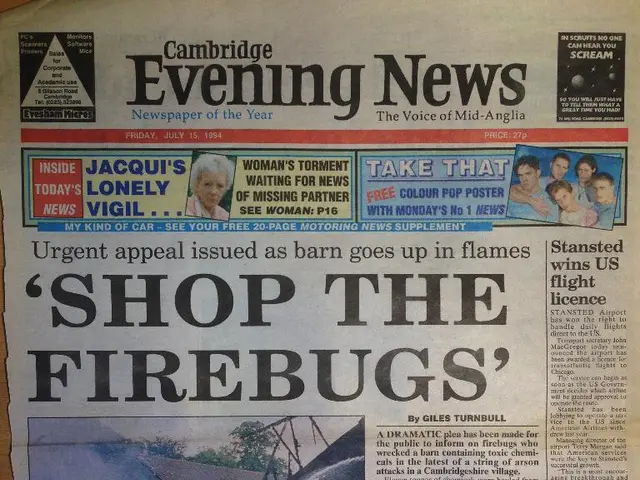Universities Clash Over Trump's Requests: A Divergent Response from Columbia and Litigation by Harvard
During the Trump era, Columbia University and Harvard University navigated government restrictions primarily through different strategies involving negotiations, settlements, and legal challenges related to federal research funding and oversight.
Columbia University
Faced with a suspension of $400 million in federal research grants due to allegations from the Trump administration that the university failed to address antisemitism and discriminatory practices on campus, Columbia University agreed to a $200 million settlement with the Trump administration. This deal included the university accepting significant government oversight and reforms, such as enhanced campus protest rules, shifting disciplinary authority, and stricter compliance measures.
The settlement allowed Columbia's scientists to resume their previously frozen grants and regain eligibility for new federal funding. However, Columbia effectively conceded to government demands, trading some institutional autonomy for restoration of funds. This settlement was seen by some critics and faculty as "caving" under pressure, with substantial government involvement in university governance during the settlement period, and the possibility of ongoing federal reviews or investigations.
Harvard University
In contrast, Harvard University responded differently by becoming the first university to defy the Trump administration’s demands and file a legal challenge. The Trump administration froze approximately $2.6 billion in federal grants to Harvard over similar antisemitism claims. Harvard took this dispute to court, framing the conflict as a First Amendment legal battle over federal control of research funding, challenging the government’s authority to impose such restrictions and oversight without due process.
The legal action by Harvard represented a direct confrontation with the Trump administration’s use of federal funding as leverage, aiming to protect institutional autonomy and resist government-imposed reforms.
Comparison of Strategies
| University | Government Action | Strategy | Outcome/Status | |------------------|----------------------------|---------------------------------|--------------------------------------------------| | Columbia | $400M federal grants frozen | Paid $200M settlement; accepted oversight and reforms | Funding largely restored; increased federal oversight and compliance | | Harvard | $2.6B federal grants frozen | Legal challenge to freeze; First Amendment lawsuit | Ongoing or pending legal case; resisting government demands |
Both universities were targeted as part of the Trump administration’s broader campaign to reshape higher education on ideological grounds by using federal research funding as leverage against perceived liberal campus policies. Columbia's approach was conciliatory and pragmatic, aiming to quickly restore funding at the cost of autonomy and reforms, while Harvard chose to contest the restrictions legally, defending institutional independence and free speech rights.
This dynamic illustrates the tension between federal authority and university governance during this time, with Columbia settling under financial pressure and Harvard pursuing judicial relief. The outcomes of these strategies are still unfolding, with the court ruling regarding Harvard University’s lawsuit against the Trump government expected in the coming days.
[1] NPR. (2021, January 27). Columbia University Settles With Trump Administration Over Antisemitism Allegations. Retrieved from https://www.npr.org/2021/01/27/962585323/columbia-university-settles-with-trump-administration-over-antisemitism-allegations
[2] The New York Times. (2021, January 27). Columbia University Reaches Settlement With the Trump Administration Over Antisemitism Allegations. Retrieved from https://www.nytimes.com/2021/01/27/us/columbia-university-settlement-trump-administration.html
[3] The Washington Post. (2021, January 27). Columbia University settles with Trump administration over antisemitism allegations. Retrieved from https://www.washingtonpost.com/education/2021/01/27/columbia-university-settles-trump-administration-antisemitism-allegations/
[4] The New York Times. (2020, October 9). Harvard Sues Education Department Over Loss of Federal Research Funding. Retrieved from https://www.nytimes.com/2020/10/09/us/politics/harvard-lawsuit-education-department.html
[5] The Chronicle of Higher Education. (2021, January 27). Columbia University Settles With the Trump Administration Over Antisemitism Allegations. Retrieved from https://www.chronicle.com/article/columbia-university-settles-with-the-trump-administration-over-antisemitism-allegations/248785
Application of education-and-self-development funding at both Columbia University and Harvard University was influenced by politics during the Trump era. While Columbia University chose to apply a pragmatic approach by accepting a $200 million settlement and agreeing to federal oversight in exchange for the resumption of frozen grants, Harvard University opted for a legal challenge, potentially setting a precedent for First Amendment rights in education and research funding.








